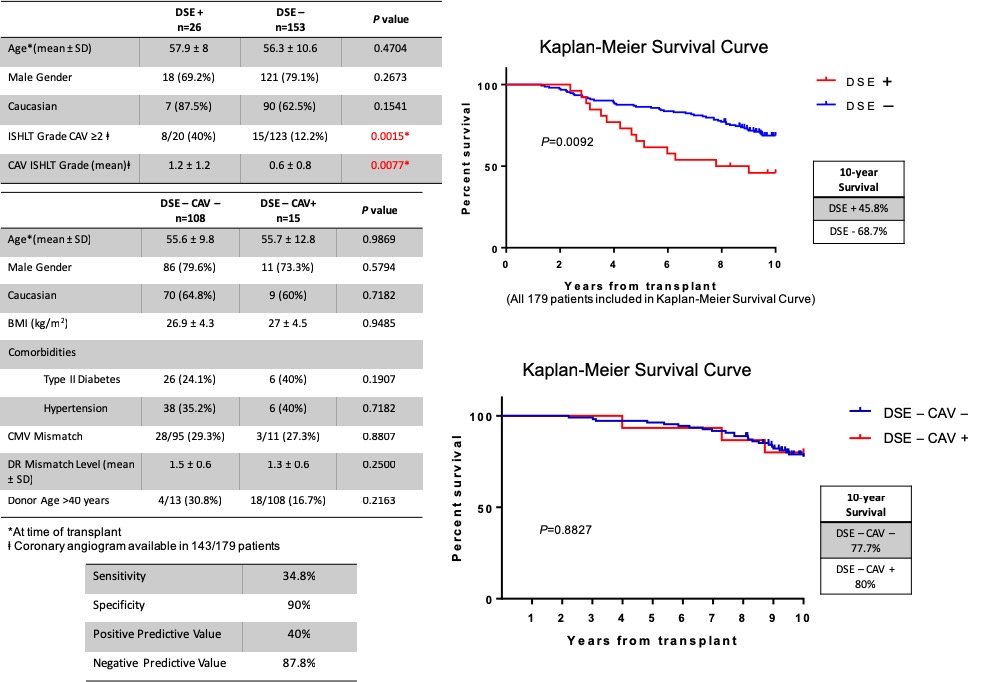Prognostic Value Of Dobutamine Stress Echocardiography In Heart Transplantation Recipients
Division of Cardiology/ JC Walter Jr. Transplant Center, Houston Methodist Hospital, Houston, TX
Meeting: 2019 American Transplant Congress
Abstract number: B88
Keywords: Echocardiography, Heart transplant patients, Survival, Vascular disease
Session Information
Session Name: Poster Session B: Heart and VADs: All Topics
Session Type: Poster Session
Date: Sunday, June 2, 2019
Session Time: 6:00pm-7:00pm
 Presentation Time: 6:00pm-7:00pm
Presentation Time: 6:00pm-7:00pm
Location: Hall C & D
*Purpose: Dobutamine stress echocardiography (DSE) carries a class IIa recommendation in the ISHLT guidelines for screening of cardiac allograft vasculopathy (CAV). Positive DSEs have a modest ability to predict development of CAV, however a normal DSE has a fairly low negative predictive value for development of angiographic CAV. The ability of a positive DSE to predict outcomes is controversial. Outcomes following a normal DSE have not been assessed in large, modern cohorts. We sought to analyze the prognostic value of DSE in heart transplantation recipients.
*Methods: All adult heart transplantations performed at our institution from 2000 to 2010 were retrospectively reviewed. Multi-organ transplant recipients, patients who expired within the first year after transplantation, and those who did not have a DSE were excluded. Patients were grouped according to their DSE result. Development of angiographically significant CAV (ISHLT grade >2) and survival were analyzed. We further analyzed outcomes in patients with a normal DSE and predictors of development of CAV in this cohort. Unpaired t-test was used for analysis. Kaplan-Meier survival curves were generated. P value <0.05 considered significant.
*Results: A total of 179 (mean age 56.6 years, 77.6% male) heart transplant recipients were included in the analysis. 26 (14.5%) patients had a positive DSE and 153 (85.5%) had a normal DSE. 143 (79.9%) patients subsequently underwent coronary angiography [median duration 9 (1.1 – 17.2) years after transplantation]. A positive DSE was associated with the development of angiographically significant CAV (40% vs 12.2%, P=0.0015) and higher ISHLT grade CAV (mean grade 1.2+1.2 vs 0.6+0.8, P=0.0077). Those with a positive DSE had a significantly worse 10-year survival (45.8% vs 68.7%, P=0.0092). Of those with a normal DSE, 15 (12.2%) developed significant CAV. In those with a normal DSE, there were no significant differences in demographics, cytomegalovirus mismatch status, HLA DR mismatch level or donor age between those who developed significant CAV compared to those who did not. Following a normal DSE, there was no difference in 10-year survival (80% vs 77.7%, P=0.88) between those who developed and did not develop CAV.
*Conclusions: DSE plays an important role in the prognostication of heart transplantation recipients. A positive DSE is associated with development of angiographically significant CAV and worse survival. A normal DSE is associated with better survival, regardless of the development of CAV.
To cite this abstract in AMA style:
Singhvi A, Araujo-Gutierrez R, Park MH, Bhimaraj A, Trachtenberg BH, Hussain I, Guha A. Prognostic Value Of Dobutamine Stress Echocardiography In Heart Transplantation Recipients [abstract]. Am J Transplant. 2019; 19 (suppl 3). https://atcmeetingabstracts.com/abstract/prognostic-value-of-dobutamine-stress-echocardiography-in-heart-transplantation-recipients/. Accessed February 15, 2026.« Back to 2019 American Transplant Congress

